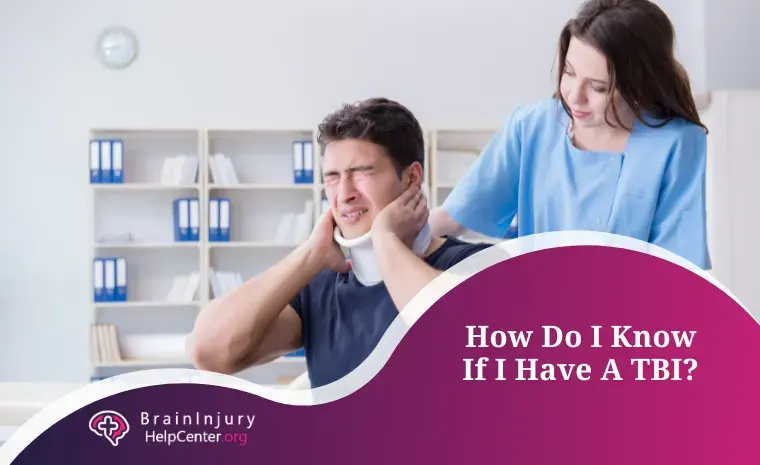In America, about 1.7 million individuals suffer from a traumatic brain injury. Among those most likely to sustain a traumatic brain injury are teens aged 15 to 19 and older adults aged 65 and above.
This injury is extremely common among athletes or military personnel. The U.S. Centers for Disease Control and Prevention (CDC) reports that TBIs are most commonly sustained in slip and fall accidents, motor vehicle accidents, and assaults.
In this article, we will discuss the following:
- What causes a TBI?
- How do I know if I have a TBI?
- When should you see a health care professional?
- Most common brain injury symptoms
- TBI diagnosis
What Causes a TBI?
A traumatic brain injury is caused by a violent bump or jolt to the head that disrupts normal brain function, or a closed head injury. A TBI also occurs when human brain tissue is pierced by a foreign object that breaks through the skull, otherwise known as a penetrating brain injury.
Not all hits to the head result in a traumatic brain injury. However, this injury may range from a mild head injury to a severe head injury. There are several types of outcomes that may develop from a TBI, such as:
- Brain Contusion – Contusions, otherwise known as bruises, are bruising on the brain or scattered areas of bleeding on the surface of the brain.
- Intracerebral Hemorrhage – Intracerebral hemorrhage or ICH is a type of brain injury that occurs when there is bleeding within the brain tissue. This can often be related to other types of brain injuries, such as contusions. Two main factors that will likely determine whether or not the hemorrhage can be removed, are the size and location in which it is found. Elevated blood pressure is commonly found in patients with ICH.
- Diffuse Axonal Injury – Diffuse axonal injury is a type of brain injury that occurs when the brain’s long connecting nerve fibers or axons are torn. This usually occurs when the brain is injured as it shifts and rotates inside the bony skull. DAI often causes coma and injury to many different parts of the brain.
- Skull Fractures – Skull fractures are common occurrences that happen following a brain injury.
- Hematoma – An intracranial hematoma is a collection of blood or blood clots within the skull, typically caused by a ruptured blood vessel in the brain, causing a block in the flow of blood. It may also be caused by head trauma, such as a car accident or fall. The blood may collect in brain tissue or under the skull, pressing on the brain.
How Do I Know If I Have a TBI?
If you have been in a situation where you hit your head, it is normal to wonder whether or not you have a head injury. It may be difficult to discern whether or not you have sustained an injury. Most especially if you have sustained a mild injury.
The following are some questions you can ask yourself to help identify whether or not you have a brain injury. Take note of whether or not this problem or condition was present before the injury, or if this has made a pre-existing issue worse.
- Are headaches more frequent following your injury?
- Are you more easily tired, either mentally or physically?
- Have you become overly sensitive to light and sound?
- Is it difficult for you to remember life details from the past?
- Have you easily lost or misplaced items?
- Do you forget what people tell you?
- Are you having memory issues?
- Have you become impulsive? Do you make decisions or say things without thinking them through?
- Are you having trouble concentrating?
- Is following a conversation difficult for you?
- Has finding the exact word you want to use become difficult?
- Is it difficult to focus on an object?
- Do objects seem further or closer than they actually are?
- Are starting new tasks difficult? Is following through with tasks harder?
- Do you experience mood swings? Is handling your anger difficult?
- Are you dealing with mental health conditions following the injury?
When Should You See a Health Care Provider?

Following an injury to the head, most especially a severe injury, injured patients must receive medical care as soon as possible. Individuals who suffered a head injury must be seen by a medical provider if they start to exhibit the following:
- Loss of consciousness
- Loss of balance
- Seizure
- Vomiting or nausea
Although a mild head injury is much harder to identify as its symptoms may be less apparent, family and friends of the victim must still keep an eye out for any symptoms that might arise following the injury.
Most Common Brain Injury Symptoms
The type of injuries, severity, and area in which the brain was injured are additional factors that contribute to the kind of symptoms one may exhibit following a brain injury. Along with the other previously mentioned symptoms, a person with a mild to severe head injury may experience any of the following common symptoms:
- Persistent headaches
- Confusion
- Slurred speech
- Dizziness
- Ringing in ears
- Numbness or tingling of arms and/or legs
- Mood swings
- Blurred vision
- Memory loss
TBI Diagnosis
Early diagnosis is essential to the rate of recovery in a patient. The earlier a diagnosis is made, the earlier hospital treatment can start. To determine whether or not an individual has sustained a traumatic head injury, a medical exam is required.
Assessment tools such as brain function tests and neurological exams will best determine the extent of the injury as they evaluate thinking, motor and sensory function, coordination, reflexes, and eye movement. Imaging tests such as CT scans and MRIs are also included in a medical evaluation.
However, these tests do not detect all TBIs but may assist their team of health care providers in ruling out other brain injuries. The Glasgow Coma Scale (GCS) is also a common tool used in assessing the extent of the level of consciousness of TBI patients.
Help is Available
Here at the Brain Injury Help Center, we understand the difficulty that comes with dealing with a traumatic brain injury and how these types of head injuries can disrupt the daily activities of a patient. We can get the medical care and support you need to help you on your road to recovery.
If your traumatic injury was caused by the negligent actions of another party, we can also put you in touch with legal representation that can help you recover compensation.
Do not hesitate to contact us at (866) 576-0936 for more information on how we can help!









